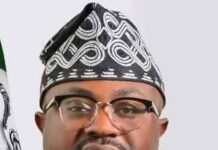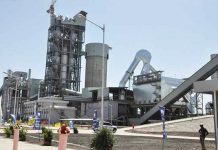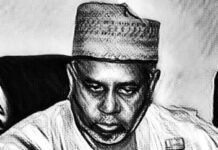Director-General of the Debt Management Office, Mansur Muhtar, spoke to Economic Confidential magazine on the London Club debt exit and other issues as President Olusegun Obasanjo will bequeath to new administration come May 29, 2007 an external debt stock of US$3.035 billion from an excruciating external debt of over US$31 billion in 1999 and US$35.916 billion in 2004. Muhtar says Nigeria’s external debt is now sustainable following the exit of the Paris Club and London Club debts on April 21, 2006 and April 4, 2007, respectively. EXCERPTS:
What was the feeling like when the country virtually exited the London Club debt on April 4?
It was a great day really. I am very delighted that we have managed to bring this chapter to a closure. Nigeria will be started afresh. I am very delighted that we had an opportunity to really give the incoming administration and future generations of Nigeria a fresh start; a new beginning that will enable them to begin the process of rebuilding the economy and also that will allow them to take away lessons from the past history in terms of these debts that we have to incur. These debts have crippled our nation’s growth for so many years. I am hoping that besides the positive benefits that would accrue from this exercise, our leaders will continuously draw lessons from this and ensure that this is never repeated in our history.
With the exit of the London Club debt, what is the value of the country’s outstanding external debt stock?
The total amount outstanding is $3.035 billion. This does not include China’s loan facility which is yet to be drawn. The outstanding debt stock comprises multilateral debt of $2.608 billion, non-Paris Club debt (bilateral) of $326.08 million, and other commercials, $101.10 million.
There is the outstanding issue of the 806,465 oil warrants, which were tendered by their owners above the government’s minimum clearing price of $220 per oil warrant. Can we then say we have truly exited the London Club debt?
For all intent and purposes, we have virtually exited the London Club debt. London Club debt, for me, is now history. Let me state here that the oil warrants are not and have never been part of the principal or part of the stock of the London Club debt. We have never counted the oil warrants as part of the London Club debt. For years now up until 2003, we never made any single payment on the debt. Iike I said, payment is linked to the prices of oil in the international market. Oil warrants are liabilities and are not debt stock. Basically, it may well be that depending on the trend in oil price movement, these liabilities would virtually become eliminated. It must however, be noted that oil warrants are not categorized as part of London Club debt stock. You will recall I have talked about reconciliation problems with the holders of these oil warrants. The reason is that for years they have been trading the par bonds and other debt instruments, but nobody cared about what happens to the oil warrants. So, par bonds have changed hands several times, but the oil warrants have been detached in the process and some are even lost. Now, the issue is that even the holders of the oil warrants do not consider them as debt instrument.
Prior to the exit, at what price could any value be attached to the oil warrants?
They way they were structured is that when oil price hits $28 per barrel that is when we start making payments. The payment is however progressive. As oil prices rise incrementally, then the payment increases. But, a maximum of $52 per barrel and now $42 per barrel. This is not a debt, but a liability. It is a liability that the incoming administration will have to look at closely and I think the experience we have garnered from this process will provide sufficient information for the new administration to be able to take a rational decision in respect of how they handle this liability.
Some State Governments claimed that the DMO had continued to make deductions for debt servicing from their monthly allocations from the Federation Account, in spite of completing the payment of their debts. Why?
There are two issues involved here. First, if you recall that after exiting the Paris Club debt we did not and appreciate that we needed to reconcile all debt figures in order to pay off the surplus states and adjust the balances accordingly from the excess crude. But because of the delay in effecting reconciliation with the states, which is being mediated by a committee set up by FAAC, we basically have to continue deduction for a period of time. And subsequently, the honorable Minister of Finance issued instructions to stop these deductions pending the finalisation of the reconciliation, which we stopped. But because the reconciliation was taken an unduly long period of time after six to nine months, we resumed the deductions only in respect of multilateral debt, which is still due and apportioned in accordance with the amount owed by the states. Certainly there are still states that are owed refunds in terms of exit payments that have been made; all of which we have to reconcile. The Federal Government has given a commitment to reconcile the payments with the amount owed. The task has to be done in a neat and orderly manner, and consideration has to taken as to the impact on releasing so much money into the economy. It may well be that the accounting or the refund will be paid back into the excess crude account of the states, not necessarily into their accounts.
Has the reconciliation of the debts owed and so far paid by the Federal and State Governments been concluded?
The reconciliation has not been concluded; it is still on course. It is taken a long time because of the difficulties that are being encountered at the committee level. The Revenue Mobilisation Allocation and Fiscal Commission (RMAFC) initially chaired the committee, but problem was that the secretariat for the committee, which is the RMAFC, could not do its job effectively in producing a report that reflected the views of the main committee and there was a lot of disagreement with what the secretariat has done. So, the committee has to be disbanded and I was made to understand that the RMAFC Chairman, Alhaji Hamman Tukur, has set another committee comprising of four or five commissioners for finance to continue with the process. I understand that the process is ongoing. The DMO and the Federal Government has been very frustrated by the protracted delay in concluding this process. We have written letters several times. The Minister of Finance has written letters several times to the Chairman of the RMAFC, urging him to expedite action on this reconciliation process so that the account will be properly and duly adjusted for the states. We are still waiting for them to conclude their reports and bring it to FAAC for consideration.
What role did Citigroup play in the 369,159 Oil Warrants debt exit?
Citigroup served as tender agents because you cannot deal directly with the oil warrant holders. So, the group served as tender agents and they were selected through a competitive process involving the three leading investment banks that we are working with on the issuance of bonds. Citigroup submitted a bid and theirs was the most competitive bid. They were the least bidder in term of the price that they offered for this job.
Which are the three investment banks involved in the bids?
The three investment banks were Merrill Lynch, JP Morgan and Citigroup.
What is the contractual fee of the dealer-manager of the oil warrants, the Citigroup?
The fees for services rendered by the Citigroup Global Market limited which will be paid amounts to $217,774.76. The contractual fee is very reasonable. We got the most competitive fee. And I can tell you that the fee they charged did not even cover their overhead cost. We have confirmed that they used an aggressive bid because they wanted to establish a relationship with Nigeria. They did it more for the long term relationship. But we have confirmed that the fee rate was below industry standard and not sufficient to cover their overhead costs. The appointment of the tender agent was subjected to all due process requirements for procurement and received the clearance of the Budget Monitoring and Price Intelligence Unit.
Would you say Nigeria’s external debt obligation is now sustainable?
It is very sustainable. Very sustainable because if you look at the overall amount we have to pay, there is a considerable reduction from the $2.9 or $3 billion, annually when we started this process. We are now down to about $500 million of annual debt service payment. It terms of debt ratio to the Gross Domestic Product (GDP), it is very reasonable. In fact, we are one of the lowest in the world. In terms of the ratio of the debt stock itself to Nigeria’s export, which reflects the country’s ability to service her debt, we are within very comfortable margin. So I am very satisfied. I think the president and this administration have done a great job and it needs to be commended for it. Nigeria’s debt is now sustainable.
What is the ratio of the debt to the GDP?
It is probably in the region of about 3 per cent.
As an expert in debt management and director-general of DMO, we expect the new government to rely on your judgment in dealing with the outstanding oil warrants. What option(s) are available for the new government to decide on?
I think I would not like to tell you ‘this is what to do’. As an expert, I believe my role is to provide the incoming administration with the various options available to it and to outline the pros and cons of each of these options, including the financial market based option, the legal based option and the decision making process. I don’t think experts should pre-judge what decisions the leadership should take. That has been my job- to clarify the options, to reviews the pros and cons, and if the situation permits, to make suggestions about preferred options. But, it is always helpfully to basically leave a leeway for the leadership to decide on the best course of actions. I am optimistic that they will make the right decisions.
What are these pros and the cons?
Well, each of the options has its own costs. If you want to go the whole length of 2020, obviously you are subjecting yourself to the dictates of oil price market and that liability is there. On the other hand, you could work out a hedging arrangement over a short period of time that enables you to discharge off this obligation through a market based transaction; or you could pay a premium for this hedging arrangement and the more premium you are willing to pay. The quicker it will be for you to retire these warrants. You could also resort to the legal course of action which in essence would entail probably protracted court cases but at least you are addressing the problem so there are different possibilities and you need to balance each of these with the overall objective trust of government.
This government has done everything to ensure Nigeria is debt-free but interestingly loans are still being undertaken such as the $2 billion loan from Chinese Government. How do we ensure that we do not revert to our former position?
There is nothing wrong with borrowing per se. It is really the terms and conditions of the borrowing. You also have to relate it to your ability to service the debt. Secondly, you have to relate it to what the money is going to be used for. I believe there is a very crucial need for increased investment in infrastructure, in power sector, for example, in railway and if there is a way you can get cheap sources of funding for that, why not. There is no way you can mobilize adequate domestic resources to meet the funding needs or the financing gaps in the sectors. Therefore, it is a normal practice to borrow money at concessionary rates, especially if you are able to invest it in order that it will yield more returns for you. But it makes good economic sense to take money and invest it in infrastructure that will yield long term benefits because the return over a longer period of time will be high. That is the whole essence of borrowing. Basically you are able to spread the cost of undertaking investment in vital infrastructure that will yield immediate return to the economy. If we have to wait and save every year it may take 10 to 15 years for you to put together the amount of resources needed in the key sectors. What we really need is to make sure that these monies are use judiciously, prudently, efficiently and in more cost effective manner and that the borrowing is from concessionary sources and that there is adequate safeguards to ensure full accountability. The National Assembly needs to be involved, the state assemblies need to be involved, civil society needs to be involved in monitoring the borrowing decision and the monitoring and the utilization of this borrowed fund.
Though we have exited a large chunk of the external debt, we still have the domestic debt to contend with. What is the present situation of the government’s domestic debt?
On local contractors, I think we have made a remarkable progress. We have succeeded in reconciling the debt and weeding out so many claims. Over hundreds of billions of naira-worth of fraudulent claims were weeded out through a very rigorous verification exercise and once we reduced it to the amount that has been verified, we commenced payment. The verification is still on-going. We have basically issued bonds on the large debts and they were very happy with that. For others we have given them cash especially to the low amount contractors and that is one major achievement if you know that this has been a lingering problem some of these debts dated back to 10, 15 years ago.

































